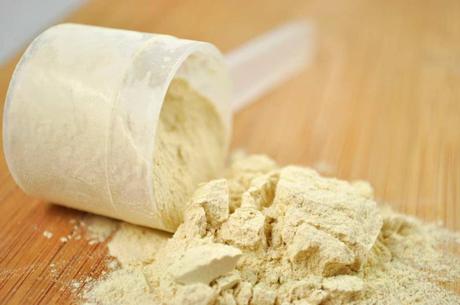
If you’re a smoothie and juicing aficionado like myself, then you are probably more than familiar with “whey.” You know the large containers of powder-like substance that bodybuilders tell you they add to every meal? It usually comes in large white, black, or clear tubs and is flavored chocolate, vanilla, or strawberry?
If you’re also like me, you’ve added two scoops to your smoothie once or twice, for the most part consider it healthy, but otherwise don’ know much about it?
If you nodded your head yes to any of the above, then this is the article for you. What exactly is whey? Is it healthy for you? Are there risks in consuming it?
What the heck is whey anyway?
What Is Whey?
In simple terms whey (pronounced WAY) is the liquid that is expelled from cheese curds during the cheese making process (Spruce). It is one of the two main proteins in milk (casein) and it is said that approximately 20% of the protein in cows’ milk is whey. In other words whey is a derivative of cow’s milk.
This protein is rich in nutrients and therefore cultivated for commercial use in a variety of products in food manufacturing.
How Is Whey Used
- Whey liquid can be used in place of water or milk in recipes.
- Whey liquid can be used to soak grains.
- Whey can be added to smoothies. Since whey is a milk protein, by adding whey to your smoothies you are boosting the amount of protein in your blended drink.
This last bullet is the crux of this post since I like many have used (and still use) whey protein powder in my smoothies.
Now that we’ve gotten the what out of the way, several questions still remain:
- How healthy is whey protein?
- What exactly are the health benefits (other than protein)?
- Are there any health risks to be mindful of when consuming whey protein?

How Healthy Is Whey Protein?
For athletes and sports people, studies show that whey protein supplementation increases physical performance. This includes runners, cyclists, and swimmers. Weightlifters and bodybuilder also require higher intakes of protein so they usually benefit from whey protein supplementation.
What about us common folk?
Whey protein is a perfect natural protein booster for everyone. Supplements in the form of powders give us the perfect opportunity to ensure our post activity protein metabolism remains in balance. Whey is also useful for aiding in weightloss as it gives a full feeling without significant unhealthy calories. High quality whey protein sources are easily absorbed and provide all essential amino acids required to boost muscle protein synthesis and develop lean body mass.
When purchasing a whey protein powder supplement you should look for an all natural variety that is free from additives, binders, fillers and added sugar.
Are There Any Health Risks?
Contrary to popular belief more protein is not necessarily better. In fact, there is protein in all food at a macro level and it is nearly impossible to be protein insufficient when consuming standard calories. I say this to say that consuming whey protein as a daily supplement to nutritionally boost a green smoothie for a more full feeling will not cause harm. However caution should be taken by those with milk allergies as some people who are allergic to milk may be specifically allergic to whey.
Like most things too much whey can lead to:
- stomach pains
- cramps
- reduced appetite
- nausea
- headache
- fatigue
We Made It
So here it is. The truth about whey (mostly) unpacked and digestable for mass consumption. Are you interested in delving deeper into more research? Check out my sources below as well as a soon to be released post where I review a natural whey protein supplement.
Photo credit: cottage cheese ( Homegrown & Healthy)
Sources:
Advertisements &b; &b;
